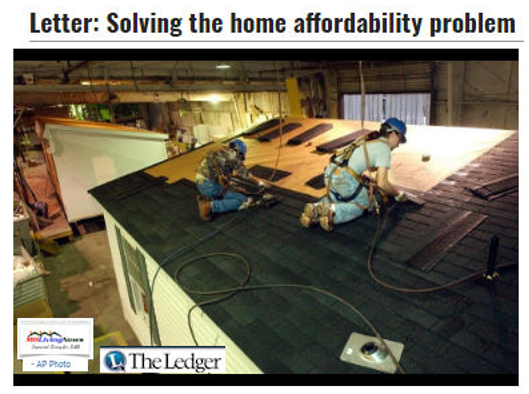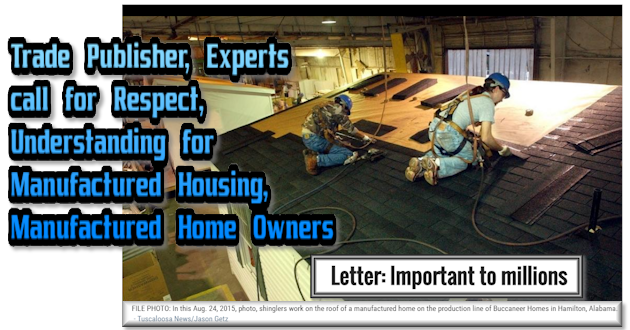
Writer Joe Dyton quotes Brena Swanson with HousingWire, who said, “Despite the negative stigma that surrounds mobile homes [sic], it doesn’t mean the 
In Weathering the Storm, How Manufactured Housing Can Do it Better, award winning consumer-interest journalist Jan Hollingsworth interviewed engineer Tim Reinhold, PhD who told her – “That box [manufactured homes] is going to be built better than any [conventional] home, unless it’s built to hurricane standards.”
For trade publisher L.A. “Tony” Kovach, setting the record straight isn’t just a matter of facts vs. myths. The future of affordable housing in the U.S. could literally depend on it.
“Millions struggle with costly housing. Bloomberg, HousingWire, Realtor and Fox News are among media that recently asked why aren’t more Americans turning to manufactured homes,” said Kovach in an op-ed published in central Florida’s Lakeland Ledger.

For the last several years, Kovach and the publications’ associates have operated the largest manufactured home public and professional trade media in the U.S. – MHLivingNews.com and the Daily Business News on MHProNews.com.
“Having interviewed manufactured home owners, experts and professionals, we know that too many still have an outdated concept of a manufactured housing, calling them “mobile homes” — or worse — ‘trailer houses,’” said Kovach.
“Yet there have been no mobile homes built in the U.S. for more than 40 years,” the publisher wrote.

“The National Fire Prevention Association report on the safety of modern manufactured housing said: ‘A manufactured home is not a motor home or a trailer, and although it is often called a ‘mobile home,’ it is not that either,”” Kovach quoted from the NFPA’s report, which is included in an article, linked here.
News agencies, industry professionals, and even a number of professionals with the highest academic degrees agree.

“Despite evidence that disproved misconceptions … negative stereotypes continued to influence local governments to impose regulatory restrictions on this type of housing,” writes Lisa Tyler, PhD.
Tyler, an associate academic dean at Bethel University, completed a doctoral study last year on “Examining Community Attitudes Toward Manufactured Housing.”
In an article published in Sarasota Florida’s Herald-Tribune, Kovach points to the recent Louisiana Floods, Hurricane Matthew and the Federal Emergency Administration (FEMA) as an example of how manufactured housing provides ready-made solutions.
“We’re told that the Federal Emergency Management Agency is calling for manufactured home retailers within 1,000 miles of Louisiana flooding, plus Florida and the Carolinas, to advise the agency if they’re willing to sell homes for emergency use,” said Kovach.

“The declaration of an emergency should remind us that manufactured homes are a 24/7/365 resource for nearly one out of 10 Floridians and nearly 7 percent of the nation.” Kovach stresses documented facts over hype or emotion. “Manufactured homes are the only federally preemptive, performance-based construction code.”
Industry professionals agree, and also point out that terminology is critical.

“The terminology matters,” says Steve Duke, executive director of the Louisiana Manufactured Housing Association, “because the terminology defines the construction standard.”
Kovach also pointed to a recently published article that included a poet laureate’s letter.

“She downsized and loves her manufactured home. Yet the poet feels the periodic sting of those calling her house a ‘trailer,’ or dismissing those living in them as ‘trailer trash.’”
Kovach concluded his op-ed as he started it. With a call to action.
“It shouldn’t take a disaster to make everyone understand how important manufactured homes are to millions in Florida and some 23 million nationally. Let’s celebrate these owners and their homes rather than dismiss or diminish them.” ##
(Image credits are as shown above.)

By RC Williams, for ManufacturedHomeLivingNews.com.
 manufacturedhomelivingnews.com Manufactured Home Living News
manufacturedhomelivingnews.com Manufactured Home Living News

































